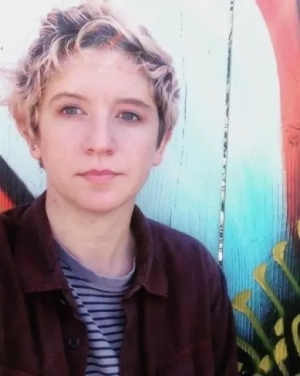
- Undergraduate
- Onstage
- Opportunities
- Foreign Study
- News & Events
- People
Back to Top Nav
Back to Top Nav
Back to Top Nav
Back to Top Nav
The Department of Theater is excited to welcome back Research Associate and Lecturer, Julia Havard, who will be teaching a brand new course, THEA 10.34: Disability Arts and Activism in Spring 2023.

Julia Havard will be teaching a brand new course, THEA 10.34: Disability Arts and Activism, this Spring.
Julia Havard is a Mellon Postdoctoral Fellow in the Department of Theater and a Smithsonian Institution Postdoctoral Fellow. She received her Ph.D. from the University of California Berkeley in Performance Studies for her dissertation entitled "Queer Burlesque's Histories, Fantasies, and Futures." Her scholarly and performance work explore sexual culture as a site of world-building, embedded in intersections of race, gender, and disability. She is a disabled white queer femme and practicing dancer, co-founder of the Bay Area Disabled Dance Collective. Her creative work has been recognized by the National Arts and Disability Center with the Arts and Accessibility Grant for her piece "Tiny Glitter Dances," which explores queer and trans disabled experiences of grief and pleasure during the COVID-19 pandemic. Her scholarly work has appeared in the Activist History Review, Radical Teacher Magazine, Women's Health Issues, and in the edited collections, #identity: Hashtagging Race, Gender, Sexuality, and Nation and Social Movements, Cultural Memory, and Digital Media: Mobilizing Media Remembrance. Her scholarship is forthcoming in the publications Disability Studies Quarterly, Performance Matters, and Periskop.
THEA 10.34: Disability Arts and Activism:
"Disability Arts and Activism" examines radical disability resistance through the lens of culture and performance to ask the central question: how does disability art make cultural change? Students will learn a history of disability activism as well as the impacts of disability policy and politics across the stage and streets. Using the frame of Disability Justice, students will develop analytic skills to unpack normative conceptions around bodies, visibility, and representation across multiple forms of difference such as size, race, class, gender, and sexuality. We will explore the performance involved in protest, alongside the protest present in disability cultural forms, such as dance, theater, music, and visual art. The course culminates in a research project that crafts an intervention into a local art space to build radical accessibility.
For more information about this course, email Catherine Jacobs.